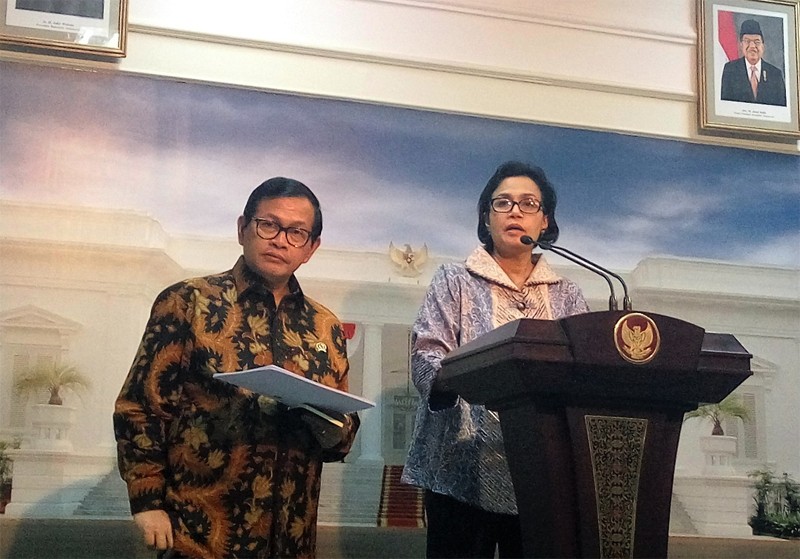Constitutional Court gets amnesty tutorial
Change Size
 Cabinet Secretary Pramono Anung (left) and Finance Minister Sri Mulyani Indrawati address journalists on Singapore's stance on Indonesia's tax amnesty at the State Palace in Jakarta on Sept. 16, 2016. (JP/Ayomi Amindoni)
Cabinet Secretary Pramono Anung (left) and Finance Minister Sri Mulyani Indrawati address journalists on Singapore's stance on Indonesia's tax amnesty at the State Palace in Jakarta on Sept. 16, 2016. (JP/Ayomi Amindoni)
A
judicial review hearing on the tax amnesty at the Constitutional Court on Tuesday became a valuable teaching moment for the government as it took the time to present its reasoning behind the controversial program.
It was the first hearing held by the court after four different judicial review petitions were submitted by five individuals and five groups, with the first petition filed on July 13.
The purpose of the hearing was to obtain explanations from the House of Representatives and the government, which were represented by Melchias Markus Mekeng, chairman of House Commission XI overseeing finance; Finance Minister Sri Mulyani Indrawati; Law and Human Rights Minister Yasonna Laoly; and taxation director general Ken Dwijugiasteadi.
Sri Mulyani’s appearance at the court could be regarded as evidence of the government’s seriousness in its efforts to quell opposition to the policy.
Just last week she managed to persuade the leaders of Muhammadiyah — the second-largest Muslim organization in the country — to drop its plan to file its own judicial review petition to the court after they met in a two-and-a-half hour closed-door meeting.
At the court, she spent 56 minutes presenting a summary of President Joko “Jokowi” Widodo’s arguments to the panel of nine judges and observers attending the court, which included petitioners from several different groups.
Sri Mulyani, a former World Bank managing director, began the explanation by emphasizing that Indonesia was a sovereign country built on the sweat, blood and tears of its people, and how it required sufficient and continued resources to maintain its independence and sovereignty.
“Therefore, the state has the right to obtain revenues to carry out its obligations and to maintain independence and sovereignty. The state’s right to collect revenues is an obligation toward its citizens,” she said.
She went on to say that as tax collection was mandated by the Constitution, it was also the state’s right to collect a portion of citizens’ income and assets.
Under the amnesty scheme, the government wishes to bring about the return of Rp 1 quadrillion (US$76. billion) worth of Indonesian-owned assets held overseas back to the country and to obtain at least Rp 165 trillion in penalty payments that it plans to use to plug this year’s state budget deficit.
The government denied the petitioners’ assertion that the law discriminated against and harmed them, insisting that it was applicable to all citizens and that it was part of a comprehensive effort to build a trusted relationship between the government and its people.
It claimed that the program offered three benefits, including the use of repatriated funds to develop the economy.
After Sri Mulyani concluded her explanation, justice I Dewa Gede Palguna told the government to make use of the open forum of the courtroom to clear up any issues that had caused public concern.
Presiding justice Arief Hidayat said the court required further accurate, firm and clear explanations from the government regarding data confidentiality, possible double taxation, retroactive implementation and the putative privilege granted to wealthy, non-compliant individual taxpayers.
The next hearing is scheduled for Sept. 28 to hear testimony from the petitioners’ expert witnesses.
However, unlike Muhammadiyah, the Confederation of Indonesian Workers Unions (KSPI), which is one of the petitioners in the judicial review, was unmoved by the government’s lengthy explanation.
“The government’s explanation offends workers because it questions our legal standing, whereas we are the ones who obediently pay taxes,” said KSPI chairman Said Iqbal.
Data from the Taxation Directorate General show that as of Tuesday evening, the amount of repatriated assets only amounted to 5.9 percent of the government’s target.
Meanwhile, the penalty payment figure was stated as amounting to 16.4 percent of the target, up significantly from the previously stated 7.3 percent, after the tax office changed its calculation method on Sept. 15.
The tax amnesty program will end in March 2017.









